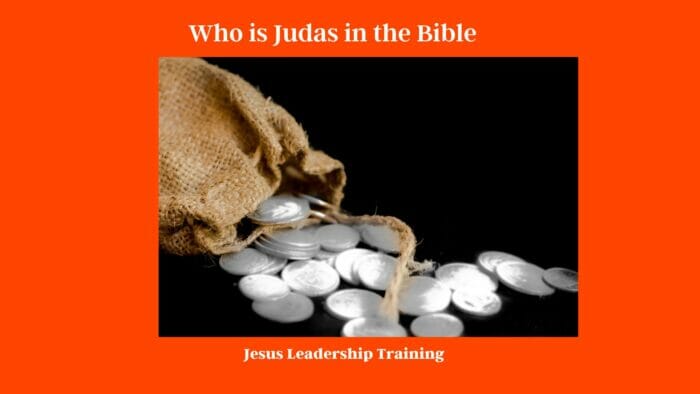Dive deep into biblical history to unravel the intricate narrative around Judas Iscariot. “Who is Judas in the Bible?” is not a simple question. Learn about his life, his actions, and the lasting impact of his infamous betrayal.
When it comes to biblical characters that have captured the collective imagination, few are as enigmatic and controversial as Judas Iscariot. Who is Judas in the Bible? If you’re familiar with the New Testament, you’ll know him as one of the twelve apostles, the man who infamously betrayed Jesus Christ for thirty pieces of silver. But who was Judas, truly, beyond his actions? This article seeks to paint a comprehensive picture of this deeply human figure, exploring his motivations, his actions, and his legacy.
Table of Contents
Who is Judas in the Bible
Judas Iscariot was one of the twelve original disciples of Jesus Christ, as depicted in the New Testament of the Bible. He is most known for his betrayal of Jesus to the Roman authorities, which set in motion the events leading to Jesus’ crucifixion.
Unraveling the Mystery: How Many Apostles Did Jesus Have | Jesus | Disciples | Christ
Despite being a close follower and trusted member of Jesus’s circle, Judas, driven by avarice, agreed to betray Jesus for thirty pieces of silver. This act of betrayal has since made his name synonymous with traitors and turncoats. Ultimately, wracked with guilt, Judas returned the money and hanged himself, as per the narrative in the Gospel of Matthew. His role in the Biblical narrative serves as a potent lesson on the destructive power of greed and betrayal.

The Apostolic Calling of Judas Iscariot
Who Was Judas Before He Met Jesus?
Unfortunately, the Bible offers little information on Judas Iscariot’s life before he became an apostle. His surname, “Iscariot,” suggests a connection with the town of Kerioth in southern Judea. However, this speculation opens another set of questions—was Judas the only non-Galilean among the apostles, and did this alienation play a part in his infamous act?
Judas Iscariot, prior to becoming a disciple of Jesus Christ, is a somewhat elusive figure as the Bible does not provide extensive details about his life before he met Jesus. It is known that his surname, “Iscariot,” is likely a reference to the town of Kerioth, implying that he might have been from this locale in southern Judea.
This would have made him the only one among the twelve disciples not from Galilee. Besides these geographical details, the specifics of Judas’s early life, his family background, his occupation, or the circumstances under which he came to follow Jesus are not explicitly outlined in the New Testament. This lack of biographical detail is typical for many biblical figures and reflects the text’s focus on spiritual, rather than biographical, matters.

1. Joining The Band of Disciples
When Jesus began his ministry, he chose twelve men to be his closest companions and learners, among them Judas Iscariot. The Bible doesn’t detail why Jesus chose Judas, leaving us to wonder—did Jesus see something special in him, or did he already foresee the betrayal?
2. Judas Iscariot: The Treasurer of The Group
Keeper of the Money Bag
The Gospel of John mentions that Judas was the keeper of the group’s money. How did this role influence his relationship with the other disciples and his perspective on their mission? Could his financial responsibilities have played a role in his later actions?
Accusations of Theft
John’s Gospel accuses Judas of stealing from the money bag. Does this suggest that Judas was motivated by greed, or is there a more complex explanation? This paints a picture of Judas as a flawed individual, making him a relatable, if not particularly admirable, character.

3. The Betrayal of Jesus: The Act that Defined Judas
The Motivation for Betrayal
The Gospels suggest different motivations for Judas’s betrayal. Matthew’s Gospel hints at financial gain, while John suggests it was Satan’s influence. However, some scholars believe that Judas might have been disillusioned with Jesus’s peaceful approach, hoping to force a confrontation with the Romans. Understanding Judas’s motivations can help us better answer the question, “Who is Judas in the Bible?”
The Act of Betrayal
The act itself—Judas identifying Jesus to the authorities with a kiss—is one of the most dramatic moments in the New Testament. This event has been immortalized in art and literature, reinforcing Judas’s image as the archetypal traitor.
4. The Aftermath of the Betrayal
The Death of Judas
After betraying Jesus, Judas experiences remorse and returns the silver coins. His death is shrouded in controversy, with Matthew and Acts offering different accounts. Did he hang himself, as described in Matthew, or did he die in a field, as recounted in Acts?
Judas in the Afterlife
The question of Judas’s fate in the afterlife has provoked heated debate among theologians. Is Judas eternally damned for his betrayal, or can he receive divine forgiveness? This theological question reveals different understandings of justice, grace, and divine mercy.
Major Events in Judas Life
Sure, here’s a table with some of the major events involving Judas Iscariot, one of Jesus’ original twelve apostles who famously betrayed Him, according to the New Testament.
| Event | Details |
|---|---|
| Call to Apostleship | Judas Iscariot was one of the twelve disciples personally chosen by Jesus to follow Him and learn from His teachings (Matthew 10:1-4). |
| Keeper of the Money | Judas was appointed as the keeper of the money for the group, a role that showed a level of trust and perhaps a nod to his administrative skills (John 12:6). |
| Objection to Extravagant Worship | When a woman anointed Jesus with expensive perfume, Judas objected, ostensibly on the grounds that the money could have been given to the poor. However, the Gospel of John states that Judas was also stealing from the disciples’ money bag (John 12:4-6). |
| Betrayal Agreement | Judas made an agreement with the chief priests to betray Jesus in exchange for thirty pieces of silver, a significant event leading to Jesus’ crucifixion (Matthew 26:14-16). |
| The Last Supper | At the Last Supper, Jesus predicted His betrayal by one of the twelve. Judas, already planning the betrayal, asked, “Surely you don’t mean me, Rabbi?” (Matthew 26:20-25). |
| Betrayal in Gethsemane | Judas betrayed Jesus to the Roman soldiers by identifying Him with a kiss, which led directly to Jesus’ arrest (Matthew 26:47-50). |
| Remorse and Death | Overwhelmed by remorse, Judas returned the silver and hanged himself, unable to bear the weight of his actions (Matthew 27:3-5). |
The story of Judas serves as a stark reminder of the damage that can be done by betrayal and greed. Despite his close relationship with Jesus, his choices ultimately led to a tragic end.
Spiritual Lessons we can Learn from Judas Life
Absolutely, here’s a table presenting some of the spiritual lessons that can be drawn from the life of Judas Iscariot according to the Christian tradition:
| Spiritual Lessons from Judas Iscariot’s Life | Details |
|---|---|
| The Danger of Greed | Judas’ actions demonstrate the destructive power of greed. Despite being in the presence of Jesus and witnessing his teachings first-hand, Judas chose to betray Jesus for thirty pieces of silver, illustrating how greed can lead one astray. |
| Proximity Doesn’t Guarantee Fidelity | Being one of the twelve apostles, Judas was physically close to Jesus. However, his physical proximity didn’t guarantee his spiritual or moral fidelity, reminding us that genuine relationship with God goes beyond mere association or appearance. |
| God’s Sovereignty | Even in the face of betrayal, God’s plan was not thwarted. Judas’ actions, while deplorable, ultimately played a part in the fulfillment of the prophesy and salvation plan of God. This illustrates God’s sovereignty even over situations that seem completely dire. |
| Importance of Repentance | Judas felt remorse for his actions but his guilt led him to suicide instead of repentance. This underscores the need for genuine repentance rather than mere regret over our wrongdoings. |
| The Consequences of Betrayal | Judas’ life serves as a stark warning against the grave consequences of betrayal. His actions led not only to his own downfall but also had a devastating impact on those around him, highlighting the importance of loyalty and trust in relationships. |
| The Deceitfulness of Sin | Judas is an example of how sin can be deceitful. From the outside, his objections to Mary’s anointing of Jesus may have appeared justified. However, his true intentions were rooted in greed, reminding us to guard our hearts against sin’s deceitfulness. |
The story of Judas Iscariot provides a profound perspective on the gravity of our choices, the need for genuine repentance, and the encompassing sovereignty of God.
Relevant Ways we can Avoid the Love of Money
Absolutely, here’s a table with several spiritually relevant ways to avoid the love of money, inspired by biblical teachings:
| Relevant Ways to Avoid the Love of Money | Details |
|---|---|
| Generosity | Cultivating a spirit of generosity can help detach ourselves from the love of money. This can involve giving to those in need, tithing, or simply being open-handed and open-hearted with our resources. |
| Gratitude | Developing a sense of gratitude for what we already have can prevent us from continually seeking more. Gratitude helps us to recognize and appreciate the value of what we already have. |
| Contentment | Paul in Philippians 4:12-13 shares about learning to be content in all circumstances. Contentment isn’t about complacency, but finding satisfaction in God’s provision rather than pursuing wealth. |
| Stewardship | Viewing ourselves as stewards of God’s resources rather than owners can change our perspective on money. This means being responsible, wise, and ethical in how we manage and spend our money. |
| Trust in God | Rather than relying on wealth for security or comfort, we can choose to trust in God’s provision for our needs. Matthew 6:25-34 encourages us not to worry about our material needs, but to seek first God’s kingdom. |
| Eternal Perspective | Recognizing that earthly wealth is temporary can help us avoid the love of money. Matthew 6:19-21 advises us to store up treasures in heaven, not on earth, because where our treasure is, there our heart will be also. |
These strategies serve as practical applications of biblical teachings, helping us to avoid the love of money and maintain a healthy, balanced view towards our finances.
If We have Sinned Greatly – What to Do
The Bible offers profound guidance and insight when it comes to addressing and dealing with severe transgressions, such as the betrayal committed by Judas. Its message can be best captured in two overarching principles: confession and repentance, and the hope for divine mercy and grace.
First, confession and repentance play a significant role in the biblical response to sin. The book of 1 John 1:9 states: “If we confess our sins, He is faithful and just to forgive us our sins and to cleanse us from all unrighteousness.” This emphasizes the importance of acknowledging one’s sins, demonstrating contrition, and striving to turn away from those transgressions. This process of confession and repentance isn’t merely about admitting wrong, but also about sincere change, turning from sin and reorienting oneself towards righteousness.
Secondly, the Bible holds out hope for even the most grievous sinner, emphasizing the depth of God’s mercy and grace. The book of Isaiah 1:18 speaks to this, saying
“Come now, let us settle the matter, says the LORD. Though your sins are like scarlet, they shall be as white as snow;
though they are red as crimson, they shall be like wool.” This signifies that no sin is beyond the scope of God’s forgiveness if a person genuinely repents. Despite the magnitude of our errors, God’s mercy is portrayed as even greater, underscoring the possibility of redemption and reconciliation, no matter how grave the sin. Thus, while Judas’ betrayal is viewed as a grave sin, the Bible presents a path of repentance and the hope of God’s abundant mercy.
FAQs
1. What does Iscariot mean in ‘Judas Iscariot’?
“Iscariot” likely refers to Judas’s place of origin, possibly the town of Kerioth in southern Judea.
2. Why did Jesus choose Judas as an apostle?
The Bible does not detail why Jesus chose Judas, leaving room for speculation and interpretation.
3. Was Judas predestined to betray Jesus?
The question of predestination versus free will in Judas’s story is a topic of theological debate. Some believe Judas had a choice; others believe his betrayal was necessary for God’s plan of salvation.
4. What did Judas do with the thirty pieces of silver?
After betraying Jesus, Judas attempted to return the thirty pieces of silver. When the priests refused to accept it, he threw the money into the temple and left.
5. How did Judas die?
There are two conflicting accounts in the Bible. Matthew’s Gospel suggests that Judas hanged himself, while Acts describes him falling in a field and dying.
6. What happened to Judas in the afterlife?
The question of Judas’s fate in the afterlife is unresolved and remains a topic of theological debate.
Final Thought – Who is Judas in the Bible
The story of Judas Iscariot forces us to grapple with complex questions about loyalty, motivation, and the nature of good and evil. Understanding Judas is not about justifying his actions, but about exploring the multifaceted nature of his character. In seeking to answer the question, “Who is Judas in the Bible?” we uncover the depth and nuance of his story, transforming him from a two-dimensional villain into a real, flawed individual.




